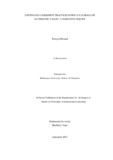
Please use this identifier to cite or link to this item:
https://hdl.handle.net/20.500.14301/527| Title: | Continuous Assessment Practices in Private Schools of Kathmandu Valley: A Narrative Inquiry.[Unpublished Mphil Dissertation]. |
| Authors: | Dhungel, Pratigya |
| Citation: | Dhungel, P. (2023).Continuous assessment practices in private schools of Kathmandu valley: A narrative inquiry. |
| Issue Date: | Sep-2023 |
| Publisher: | Kathmandu University School of Education |
| School: | SOED |
| Department: | DOEL |
| Level: | M.Phil. |
| Program: | MPhil in Educational Leadership |
| Abstract: | This study aims to explore continuous assessment systems in private schools of the Kathmandu Valley. I was interested in diving into this topic because of the bitter experience I had as a student in my school life. As a student with no memorizing skill, I was levelled as a bad student because I could not score good marks during term-end examinations. This experience made me look for practices that evaluated students beyond memorizing and recalling skills. To pursue this study, I generated two research questions: how do the teachers of private schools in Kathmandu valley perceive the assessment system? In what way do teachers practice continuous assessment in the classroom? The participants were selected based on their experience and enthusiasm to be a part of this research and the quality of the information they provided. Information was collected through distinct phases of the interview. The collected information of participants was then organized, codded, thematized, and meanings were made, merging literature and theories of constructivism. To make the gathered information more organized, four themes: (i) traditional assessment as a barrier to learning, (ii) readiness to change as the necessity in assessment, (iii) uses of rubrics for evaluation, (iv) continuous assessment system as a factor for the development of the positive mindset in learners have been generated, which has made the interpretation and meaning-making more effective and concise. This study reveals that private schools in the Kathmandu Valley use various forms of continuous evaluation, such as projects, quizzes, and assignments. However, these practices are not always aligned with the curriculum and are often used as a means of grade promotion rather than an effective learning tool. The study emphasizes the requirement for evidence-based continuous assessment techniques in private schools to enhance student learning and growth. The results suggest that teacher training, collaboration between teachers and administrators, and ongoing support from school leaders are critical for the successful implementation of continuous assessment. The findings of this study could provide valuable insights for educators, administrators, and policy makers working to improve the quality of education in private schools in the Kathmandu Valley. |
| URI: | https://hdl.handle.net/20.500.14301/527 |
| Appears in Collections: | Disertation |
Files in This Item:
| File | Description | Size | Format | |
|---|---|---|---|---|
| 28 SEPT-Final Thesis-Pratigya Dhungel (Mphil_Educational Leadership).pdf | 725.77 kB | Adobe PDF |  View/Open |
Items in DSpace are protected by copyright, with all rights reserved, unless otherwise indicated.